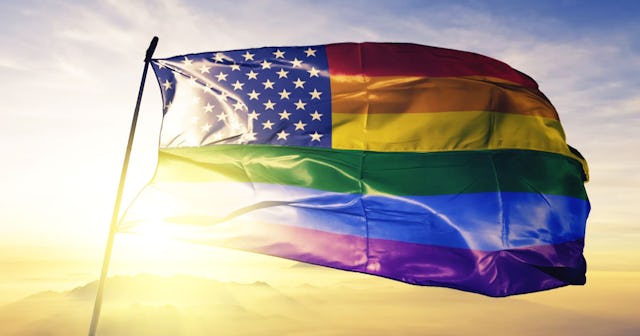LGBTQ History Is American History, So Teach It In All Public Schools

When we study history, we are studying past events. We are examining, celebrating, and sometimes cringing at significant happenings that shaped a location and the people living there. Sometimes an event or movement is so large that it has a butterfly effect; the impact ripples across nations and through cultures and changes the tide.
History shows us what works and what doesn’t. History foreshadows the present and helps us navigate the future. The people who made memorable history come in many genders, races, religions, socioeconomic backgrounds, education levels, and sexual orientations. Yup, whether you like it or not, lots of LGBTQ folks have left beautiful marks on this world and their accomplishments, the LGBTQ history makers, need to be a part of every school’s curriculum. This is not something that should be swept under the rug. It’s vital, important, and should be acknowledged.
Plenty of people don’t like it, though. Parents in Rocklin School District outside of Sacramento recently pulled 700 children out of classes because the new, narrowly passed curriculum was going to include the accomplishments of LGBTQ Americans.
SPOILER ALERT: Your kids have been learning about queer folks for a long time. There are plenty of closeted and unconfirmed LGBTQIA+ people already in your child’s text books. Sally Ride, Eleanor Roosevelt, Leonardo Da Vinci, Steve Jobs—okay that last one wasn’t really unconfirmed, but you can thank a queer (Jobs’ business partner, Tim Cook) for giving you that smart phone in your and your kid’s pocket. Anyway, the protest was started because—gasp—we are showing our students that LGBTQ people deserve respect and credit too.
The school district has 12,000 students, so plenty of parents either didn’t care enough to keep their children away from said human decency or they support Rocklin’s decision to have a thoughtful and inclusive curriculum, with lessons geared to start in second grade. Protesting parents thought that kids at that age would be confused about LGBTQ people and that 7- and 8-year-olds should not be exposed to “those” topics at such a young age.
First of all, I see you bigots. Stop sexualizing LGBTQ people. If people would see me and my queer friends as humans first and not sexual deviants and pedophiles, they would see that our lives are not that different or controversial. We really just want safe places to live, loving partners, and secure jobs—you know, equality. Some of us have big ideas and the motivation to go with them to make the world a better and more creative place. We have the determination to start revolutions and fight for what should be basic human needs. LGBTQ pioneers and innovators have been making the world better for everyone, including the bigots who pulled their kids—some of whom I promise you will eventually come out as a part of the LGBTQIA+ community—from class. They deserve to have their names be known.
And all students need to know them too. According to the Human Rights Campaign 2018 LGBTQ Youth Report, only 13% of youth report hearing positive messages about being LGBTQ in school. The report also revealed that only 26% of LGBTQ students always feel safe in the classroom. There is a direct relationship here, friends. It’s not just the negative messages that are born out of and perpetuate bigotry and bullying, it’s the lack of positive conversations about LGBTQ people and topics. We can’t educate allies and we can’t support LGBTQ folks if we avoid talking about them.
Also, it’s American history. Fucking teach it.
David McNew/Getty
When kids are not exposed to all types of families and genders, they think heterosexual relationships and cisgender, binary genders are the norm. When kids are not allowed to bust gender stereotypes and play with gender expressions that best match exactly who they are, there is a very clear message sent that there are expectations on what it means to be masculine and feminine and who is allowed to hold onto those characteristics. And for the LGBTQ kids who do not fit this heteronormative narrative, they are told they are weird, different, and wrong.
Normalizing all kinds of people and the ways they love benefits those LGBTQ kids who feel unsafe. Representation makes a kid feel less alone—whether they are out or not—and helps build allies and a baseline of respect for what some kids are never exposed to because they live with bigoted parents. We all have gender, expression, and sexuality. We all have a need to be seen and celebrated, and the sooner we can encourage this at school, the better.
Illinois is trying to become the first state in the Midwest to pass a bill that would require schools to include LGBTQ topics and individuals into the curriculum. Mike Ziri, policy director at Equality Illinois said, “That could be contributions of folks like Harvey Milk, or Jane Addams. You know, it could be the history of the civil rights work at Stonewall in New York City in 1969. All of this rich history is omitted from curricula and from history.”
And Rachel Henry, Sacramento LGBT Community Center spokeswoman, added this: “There are several empirical studies that show textbook curriculum that is explicitly inclusive of the LGBTQ+ has dramatically positive effects on school climate for both LGBTQ+ and non-LGBTQ+ students. Students of marginalized groups, such as the LGBTQ+ community, have a right to see themselves reflected in the history that they study.”
We can’t be successful unless we are seen, and for queer kids there are few better ways to feel understood than in the pages of a textbook meant to teach the importance of LGBTQ people.
This article was originally published on